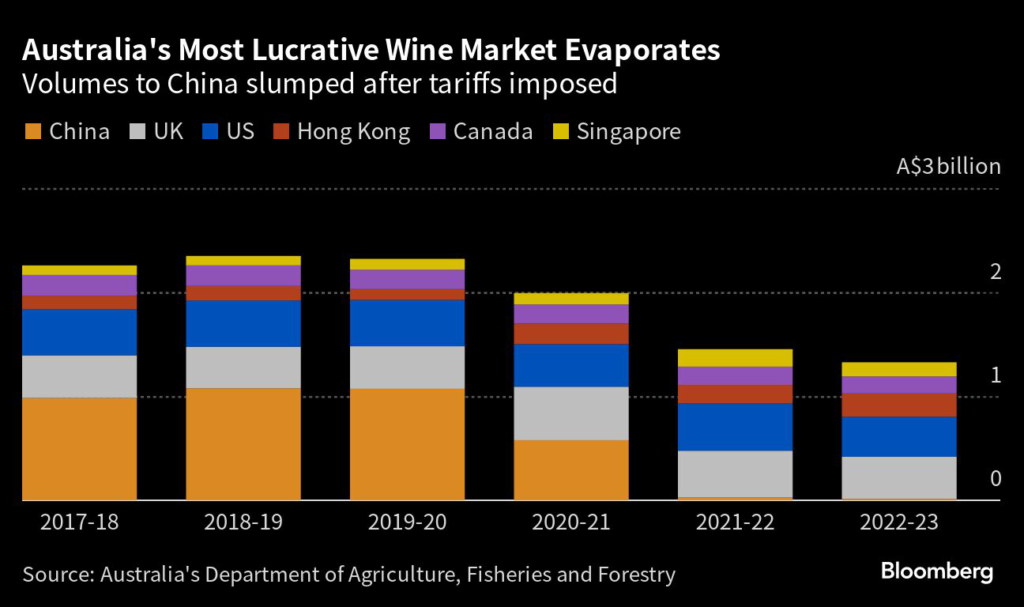Australia’s Prime Minister Anthony Albanese will visit China next month in the latest sign of thawing ties after a years-long dispute, with the two sides signaling a deal toward ending Chinese tariffs on Australian wine exports.
(Bloomberg) — Australia’s Prime Minister Anthony Albanese will visit China next month in the latest sign of thawing ties after a years-long dispute, with the two sides signaling a deal toward ending Chinese tariffs on Australian wine exports.
Albanese will travel to China from Nov. 4-7, the first by an Australian leader since 2016. The government has been working with Beijing to remove obstacles on trade, including on wine, and has “reached an agreement with China to move forward to resolve this dispute,” Albanese’s office said in a statement Sunday.
Australia will suspend its case at the World Trade Organization over China’s tariffs on wine imports, while Beijing will undertake an “expedited” review of its wine tariffs — a process that is expected to take five months.
“If the duties are not removed at the end of the review, Australia will resume the dispute in the WTO,” according to the statement. “We are confident of a successful outcome.”
The announcement on wine tariffs is another step toward normalizing relations between the two countries. Earlier this month, China released Australian journalist Cheng Lei from about three years of detention for allegedly passing national secrets to an overseas institution. Australia said last week it would end anti-dumping tariffs on Chinese exports of wind towers, and would allow a Chinese firm to continue to lease a port in the country.
China responded to Australia’s statement on the same day, with the Ministry of Commerce saying the two countries have had “friendly negotiations” over wine and wind tower disputes and reached a consensus on properly solving them. It didn’t provide specific details about the next steps related to its wine tariffs.
China imposed steep tariffs on Australian wine in 2020 as diplomatic relations between the nations soured, with trade in other commodities such as coal and seafood also affected. The wine market was Australia’s most valuable prior to the implementation of duties, worth more than A$1 billion ($631.4 million) in 2018-19 and 2019-20, according to the nation’s agriculture department.
“We’re very confident that this will result in once again Australian wine, a great product, being able to go to China without the tariffs,” Albanese said at a press conference on Sunday. He added that this was “critical,” as the wine industry has struggled to fill the gap left by China’s business.
The agreement with Beijing buoyed shares of Australian vintner Treasury Wine Estates Ltd. on Monday, with the stock rising as much as 5.3%. The company said it’s well placed to rebuild its business in China should tariffs be removed at the end of the review period.
The move toward ending duties on wine follows Beijing’s removal of penalties on the nation’s barley exports in August that allowed for a resumption of trade. Australian Agriculture Minister Murray Watt noted in a post on social media platform X that the agreement on wine follows the “same process as removal of trade barriers on Aussie barley.” China in April agreed to review the barley tariffs and then lifted them about four months later.
Albanese arrives in Washington on Monday to kick off a month of critical diplomatic engagements. He will meet with President Joe Biden and attend a state dinner — becoming just the fourth Australian leader to be accorded such an honor. The visit will focus on “building an alliance for the future,” Albanese told parliament last week, adding that strengthening the partnership with the US on critical minerals and green energy will also be on the agenda.
Read more: US, China Visits Put Australian PM’s Diplomatic Skills to Test
During his China trip, the prime minister will meet with President Xi Jinping and Premier Li Qiang in Beijing and will also attend the China International Import Expo in Shanghai. The leaders will discuss cooperation in areas including economic links and climate change.
“I look forward to further engaging with President Xi and Premier Li in Australia’s national interest,” Albanese said. “I welcome the progress we have made to return Australian products, including Australian wine, to the Chinese market. Strong trade benefits both countries.”
–With assistance from Hallie Gu, Ben Sharples, Jessica Sui and Ben Westcott.
(Updates with shares in ninth paragraph)
More stories like this are available on bloomberg.com
©2023 Bloomberg L.P.










